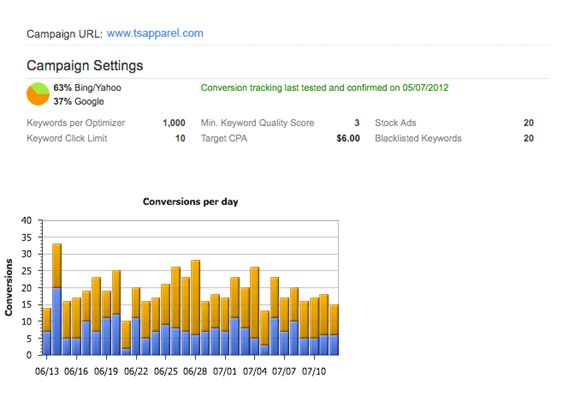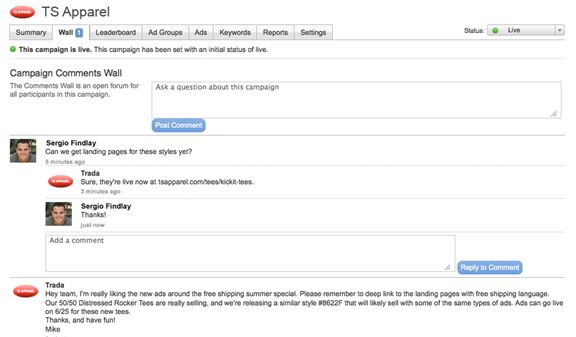Crowdsourced SEM: Under The Hood With Trada
In the June 2006 Wired magazine article The Rise of Crowdsourcing, Jeff Howe presented the phrase crowdsourcing as a combination of the words crowd and outsourcing. Although crowdsourcing actually has roots that precede the Internet, certainly the Web has been a powerful activation tool for crowdsourcing to go mainstream. In fact, there are crowd workers in […]
In the June 2006 Wired magazine article The Rise of Crowdsourcing, Jeff Howe presented the phrase crowdsourcing as a combination of the words crowd and outsourcing. Although crowdsourcing actually has roots that precede the Internet, certainly the Web has been a powerful activation tool for crowdsourcing to go mainstream.
In fact, there are crowd workers in almost two hundred countries. Alone, Amazon’s popular micro-task, crowdsourcing platform, Mechanical Turk, has almost a half million users — an argument could be made that they are the largest employer in the world!
Trada, who bills themselves as “the only performance-based paid search marketplace” has gained some fantastic momentum in the last few years. Their primary function is to match SEM advertisers with paid search specialists (called Optimizers) who work remotely to manage and optimize these companies’ paid search efforts via Trada’s centralized platform.
Through this unique approach, Trada feels this process facilitates the very best way to crack the paid search efficiency puzzle: saving advertisers time and driving down costs. It is an alternative to working with an agency or to hiring an in-house team.
I spoke with Niel Robertson, the highly entrepreneurial Founder and CEO of Trada, to learn a bit more on how this matchmaking actually works:
The size of your team is entirely dependent on budget and other factors, but in general you can expect that we will start with a small team of experts – usually between 3 and 8 – who are specifically qualified to work on your campaign. We use an algorithm called Optimizer Matching, which collects information about the experts’ unique skillsets and their historical performance in the Trada system, and assigns them to campaigns whose objectives they can best serve. In paid search, the strategies used to achieve different goals are highly variant, so subject matter expertise in an advertiser’s vertical, size, and conversion type are critical to success.
This preliminary curation of your Optimizer team ensures the best possible performance right off the bat, and over time we may increase the number of experts on your campaign.
So how does their system work? It’s a simple concept – though there’s some deep tech involved in making it all happen. Potential Optimizers must pass a certification to be part of the platform and, when assigned to an account, build out their own ad groups, keywords, bids and strategy.
The advertiser sets a conversion cost goal which the Optimizers try to beat by building the best campaigns. Keywords and ads come to the advertiser for review, and they can approve or reject various components throughout the process and can offer feedback.
Trada puts the collective Optimizer work into a single campaign and launches it on the search networks (Google, Yahoo and Bing). The networks themselves decide which ads to run based on which are the most effectively optimized.
Any of the Optimizers working on a single campaign could now be simultaneously generating clicks and conversions with their ads, and the advertiser has the great advantage of the collective expertise of multiple search practitioners on a single account.
Each time an individual Optimizer’s work generates a conversion, she gets paid the difference between the advertiser’s conversion goal and the price she was actually able to generate the conversion for. In this model, the goals of the advertiser and his workers are perfectly aligned: everyone wants low-cost conversions!
Sound’s easy enough, right? Let’s dive into their system to see how it all works.
Here, in the Leaderboard, you can see all of the Optimizers who are working on your campaign, their performance, and their statistics. You know their real names, and you can message them for questions or feedback.
Ads come to an advertiser for review before they go live on the networks:
Trada’s algorithms ensure that an advertiser is getting the best possible price for the most conversions across networks. The Budget Split tool dynamically reallocates budget among the engines based on conversion data.
One of Trada’s most commonly asked questions is whether or not Optimizers can use the same keywords as other Optimizers. Yes, they can, and this creates an ideal situation: because the keywords are in different ad groups, connected to different ads, the engine algorithms decide from which group the keyword will be pulled from based on what is converting best. It is like having a complex testing tool designed to drive down conversion costs on individual keywords.
On the Wall, Optimizers have the opportunity to ask questions and make suggestions to the advertiser or to each other. Advertisers can also communicate new products and strategies.
Even Trada’s logo hints to crowdsourcing. If you’ve been to any search conferences in the last few years, you’ve seen the Trada booth with the gumball machines.
We’re often asked why we have gumballs in the Trada logo. Trada was founded on the basic principle of the Wisdom of the Crowd – that a crowd of people working on a problem is collectively more effective than any one person could be working on the same problem. Harnessing the collective power of a crowd – in our case a crowd of Paid Search experts – is what makes Trada so effective for advertisers in our marketplace.
The classic example of the Wisdom of the Crowd is the gumballs-in-a-jar game where a group of people is asked to guess the number of gumballs in a jar. While the individual estimates vary widely, the averaged guess of each person in the crowd approximates the actual number of gumballs more accurately than the best individual guesser. We’ve tried the gumballs-in-a-jar game and it really works!
Cool stuff. Advertisers who find Trada’s concept intriguing may want to see how the Wisdom of the Crowd could help their business. According to Trada, the platform works best for mid-market companies and larger SMBs, who have sophisticated marketing needs (a really optimized campaign and aggressive goals) but who may not always have the time or in-house expertise to execute.
And if you’re a paid search expert and think you have the chops, you might want to consider signing up and see if you can generate some supplemental (or full time!) income on this platform.
Opinions expressed in this article are those of the guest author and not necessarily Search Engine Land. Staff authors are listed here.
Related stories




